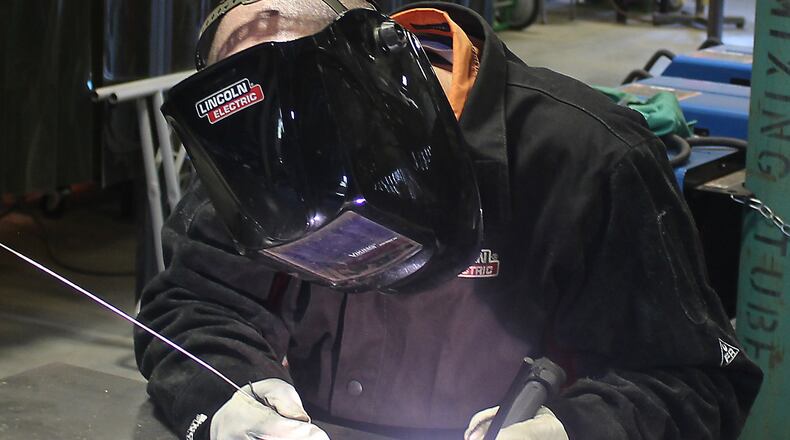Clark State Community College in Springfield received its first and only TAACCCCT grant in October 2014. Springfield is in the center of many legacy manufacturing firms, such as Navistar, and many growing businesses, such as the numerous Honda suppliers. One of the ways that Clark State has sought to sustain its TAACCCT grant is to continue to build short-term certificates as well as add an applied baccalaureate degree in Manufacturing Technology Management. In fact, the need to sustain the work of the grant and continue to provide skilled manufacturing workers in Clark State’s region has dovetailed with Ohio Gov. John Kasich’s focus on workforce.
RELATED: Clark State expanding college prep program
In his 2017 budget, Gov. Kasich asked for the development of specific job-focused baccalaureate degrees that fill critical workforce needs in our communities. Clark State immediately stepped forward to fill this need, and, as a result of TAACCCT, was primed and ready to move forward. We developed partnerships with Honda America, Cascade Manufacturing, and McGregor Metalworks to develop a responsive degree that leads to management and supervisory careers as well as higher-level hands-on skills at the top employers in our region. While this proposal has yet to pass the Ohio Legislature, community colleges are optimistic that state legislators recognize the responsiveness of community colleges and the employer need for these credentials.
Community colleges train the future workforce and upskill the current workforce in order to be responsive to industry needs. As a result of this mission, community colleges must be flexible and offer multiple pathways into the workforce to enable the growth of our economy and the future success of Ohio. For this reason, community colleges offer certificates of value, or short-term certificates, associate’s degrees, and job-focused baccalaureate degrees.
RELATED: Clark State hires retired Wright-Patt commander as vice president
Students who pursue short-term certificates at Clark State have found real-market value in attaining these credentials. For this reason, Clark State plans to develop more short-term certificates in order to upskill the existing workforce and allow for a an early entry point for the unemployed and underemployed. For example, Clark State’s basic manufacturing certificate at comprises 15 weeks and, upon completion, results in an entry-level manufacturing job paying approximately $12 per hour in our region. If the student chooses to continue an additional 15 weeks and pursuing a certificate in one of four areas, such as welding, industrial maintenance certificate, Computer Numerical Controls’ (CNC) operator or additive manufacturing, he or she increases his pay to $18 to $22 per hour. The value of these short-term certificates, particularly in STEM and career-focused fields, cannot be underestimated.
Since receiving a $2.5 million TAACCCT grant in 2014, Clark State has kept a laser focus on training in manufacturing, as this industry is key to our region’s growth. We have gone from training fewer than 20 students annually in 2013 to deploying these grant monies in working with more than 300 students since the inception of the grant in 2014. This applied baccalaureate degree, along with our existing five short-term certificates and associate’s degree, is the next logical step in this career pathway for our students. Clark State students who are on the engineering, management or manufacturing tracks would be able to continue their education with us and obtain this four-year degree awarded by Clark State Community College.
COMMENTARY: Clark State and its graduates have positive impact on region
Over the next decade, nearly 3.5 million manufacturing jobs will be needed, and 2 million are expected to go unfilled due to the skills gap. Moreover, according to a recent report, 80 percent of manufacturers report a moderate or serious shortage of qualified applicants for skilled and highly skilled production positions, specifically in supervisory roles. Additionally, for every $1 spent in manufacturing, another $1.40 is added to the economy. Manufacturing is critical to Ohio’s economic future, and Clark State is well-positioned to assist in its training and educational support at all levels of this vital industry.
Clark State continues to work closely with local industry partners. It will be these industry partners that will help guide us when we are ready to shape the curriculum for additional short-term certificates and for this four-year degree in Manufacturing Technology Management. Additional short-term training and the development of an applied baccalaureate degree in Manufacturing Technology Management are the keys to the sustainability of TAACCCT at Clark State.
Jo Alice Blondin, Ph.D., is president of Clark State Community College.
Submissions welcome
Community members are invited to submit a Community Commentary column for publication. Columns should be approximately 500 words in length and will be edited for publication. The News-Sun will make the final decision on whether they will be published. Any column submissions should be emailed to Springfield News-Sun Editor Samantha Sommer at samantha.sommer@coxinc.com. For more info, call 937-328-0346.
About the Author
